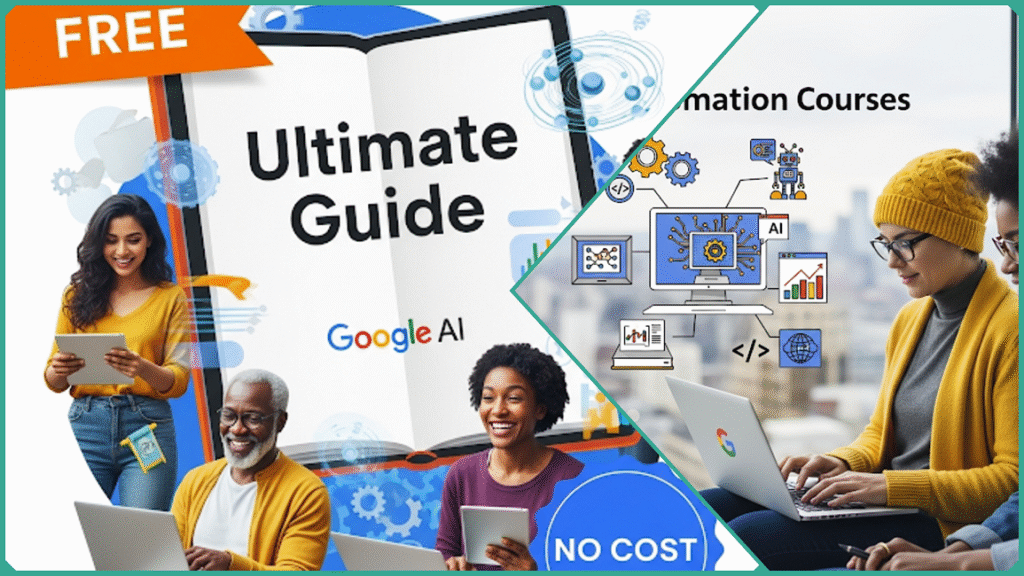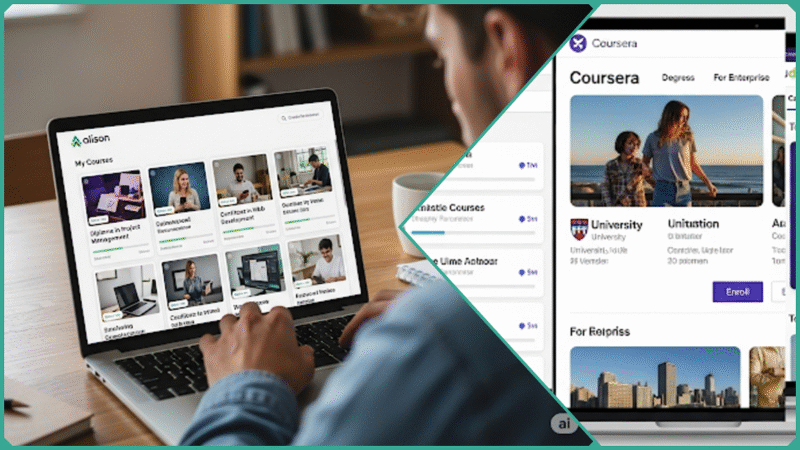Free AI Automation Courses Online: The Ultimate Google Guide
Estimated reading time: 22 minutes
Mastering AI and automation skills is now indispensable in today’s fast-changing digital world. Whether you’re a beginner exploring AI’s possibilities, a professional seeking to enhance your skills, a small business owner aiming to streamline operations, or a lifelong learner passionate about technology, Google’s free AI automation courses provide a reliable and accessible pathway into this transformative domain.
This comprehensive ultimate guide is designed to walk you step-by-step through the best free courses offered by Google on AI automation. It will help you thoroughly understand essential key concepts, explore the most current and relevant trends in the field, and answer all your pressing questions in detail.

Every aspect has been meticulously optimized to equip you with the essential knowledge and unwavering confidence necessary to successfully embark on your AI learning journey. This thoughtful preparation ensures that you are able to make significant progress right from the very start, setting a strong foundation for continued growth and achievement in the field of artificial intelligence.
Why Google AI Automation Courses?
Google AI Automation courses are highly valued and widely respected because they seamlessly combine the latest cutting-edge advancements in artificial intelligence with practical, hands-on learning experiences that are designed to be accessible and engaging for a broad spectrum of learners.
These courses are thoughtfully crafted to cater to individuals at different skill levels, from beginners to advanced practitioners, ensuring that everyone can benefit from the wealth of knowledge offered.
Here’s a detailed explanation of why Google’s AI courses stand out in the crowded field of online education and why they represent an excellent choice for anyone looking to deepen their understanding of AI and automation technologies:
- Credibility and Quality: Developed by top AI experts at Google, these courses reflect the latest advancements in AI technology, ensuring learners gain knowledge that is current and industry-relevant. For example, the Google AI Essentials course on Coursera offers practical, hands-on experience guided by Google specialists who aim to make AI helpful and accessible for everyone.
- Accessibility for All Skill Levels: Google’s courses are designed to be approachable for beginners without any coding or AI experience, while also catering to professionals seeking to deepen their expertise. This inclusivity allows diverse audiences—from marketing professionals and educators to developers and data scientists—to learn AI automation at their own pace.
- Certification for Career Advancement: Many courses provide certificates upon completion, allowing learners to showcase their AI skills on resumes and LinkedIn profiles. This is valuable for career changers, upskillers, and those looking to enhance professional credibility.
- Hands-on Learning and Real-World Application: Google emphasizes practical projects that help learners apply AI tools directly to work tasks—whether it’s generating content, organizing data, automating workflows, or enhancing decision-making. Such experiential learning accelerates skill acquisition and immediate productivity gains.
- Focus on Responsible AI Use: In addition to teaching technical skills, Google courses also cover AI ethics, responsible AI deployment, and how to critically evaluate AI outputs, which is crucial for building trustworthy AI applications.
- Integration with Google’s AI Ecosystem: These courses often introduce learners to Google’s powerful AI tools like Vertex AI, TensorFlow, and Google Gemini, preparing students to utilize industry-leading platforms for machine learning and automation.
In Summary
Google AI Automation courses offer a comprehensive learning experience by combining expert-led content, flexible and customizable learning paths, widely recognized certifications, hands-on practical exercises, and a strong emphasis on the responsible and ethical use of AI technologies.
This well-rounded approach empowers learners from diverse backgrounds and skill levels to confidently adopt, implement, and leverage AI automation tools and techniques effectively in both their personal projects and professional careers.
Key Concepts in Google AI Automation
To fully harness the potential of AI for automation purposes, it is essential to gain a clear and thorough understanding of its fundamental core principles. In this section, we will take an in-depth look and dive deeply into the key concepts and foundational ideas covered extensively in Google’s AI automation courses.
This knowledge will empower and equip you with the confidence and skills needed to effectively apply these advanced and innovative tools to your everyday work and various projects.
Artificial Intelligence (AI)
Artificial Intelligence refers to the simulation of human intelligence processes by machines, especially computer systems. These processes include learning (the ability to acquire and apply knowledge), reasoning (using rules to reach conclusions), problem-solving, perception (interpreting sensory input), and language understanding.
- In the context of Google AI Automation, AI technologies are used to build intelligent systems that can automate complex tasks that traditionally require human intelligence. For example, Google’s AI models can understand natural language, recognize images, and predict outcomes — enabling automation in areas such as customer support, content generation, and data analysis.
Automation
Automation refers to the use of advanced technology and systems to carry out processes or tasks independently, without the need for direct human involvement. By leveraging automation, organizations and individuals can achieve significant enhancements in overall efficiency, maintain consistent performance levels, and substantially reduce the likelihood of errors occurring during operations.
- With AI automation, machines don’t just follow predefined rules (like traditional automation); they also learn from data and adapt over time. Google’s Vertex AI, for instance, allows businesses to automate workflows such as predictive maintenance, marketing campaigns, or fraud detection by integrating AI models directly into their operations.
Generative AI
Generative AI is primarily focused on the creation of entirely new content or data that closely resembles the original input data it was trained on. This advanced technology encompasses the generation of a wide variety of outputs, including but not limited to text, images, music, video, and even computer code.
It achieves this by leveraging sophisticated neural network architectures such as GPT (Generative Pre-trained Transformer), which have been designed and optimized for understanding and producing human-like content across multiple domains.
- Google Gemini and Google’s generative AI models are examples that produce human-like text responses or creative content. Generative AI plays a vital role in automating tasks like writing, brainstorming ideas, creating marketing content, or developing code snippets, all without manual effort.
Machine Learning (ML)
Machine Learning is a specialized subset within the broader field of Artificial Intelligence (AI) that focuses on developing algorithms capable of identifying and learning patterns from large sets of data. These algorithms can enhance their performance progressively on particular tasks by analyzing data and adapting their processes without the need for explicit programming instructions for every single task.
This continuous learning approach allows machines to improve accuracy and efficiency autonomously as they are exposed to more information over time.
- In Google AI Automation, ML models analyze vast datasets to identify trends or make predictions. Services like TensorFlow (Google’s open-source ML library) and Vertex AI help developers to build, train, and deploy ML models that automate decision-making, customer personalization, and data processing.
AI Ethics and Responsibility
As artificial intelligence systems become increasingly integrated into various aspects of society and business operations, the importance of ethical considerations grows more critical than ever before.
AI Ethics encompasses the responsibility to ensure that AI tools and technologies are thoughtfully designed and implemented in ways that promote fairness, maintain transparency, uphold accountability, and consistently respect individual privacy as well as fundamental human rights.
- Google emphasizes responsible AI practices by promoting guidelines and courses that encourage fairness (avoiding bias), explainability (understanding how AI makes decisions), privacy protection, and compliance with regulations. This ensures AI automation benefits everyone while minimizing potential harms.
Summary of the Key Concepts in Google AI Automation
| Concept | Definition | Relevance to Google AI Automation |
|---|---|---|
| Artificial Intelligence (AI) | Machines simulating human intelligence | Powers smart automation tasks like language and vision |
| Automation | Technology performs tasks without human intervention | Enables efficient, error-free workflows |
| Generative AI | AI creating original content (text, images, code) | Automates creative and content-driven processes |
| Machine Learning (ML) | AI subset learning from data to improve over time | Builds predictive models and automates decision-making |
| AI Ethics & Responsibility | Ensuring AI is fair, transparent, and accountable | Promotes trustworthy AI use in Google’s tools and platforms |
Google’s Top Free AI Automation Courses
Here is a comprehensive and informed overview of Google’s Top Free AI Automation Courses, enriched with additional insights derived from detailed reviews and comprehensive course descriptions:
Google AI Essentials
- Platform: Grow with Google
- Duration: ~5 hours, self-paced
- Audience: Complete beginners, non-technical professionals
Course Overview: Google AI Essentials is designed as an entry-level course that introduces learners to AI fundamentals and practical applications without requiring any prior coding or technical experience. It teaches how to use generative AI tools to automate tasks such as content creation, brainstorming, and data analysis. The course includes real-world scenarios that demonstrate how AI can boost productivity in marketing, HR, education, and small business contexts.
- Why it stands out:
- Taught by Google AI experts, the course uses clear visuals, analogies, and interactive exercises to demystify AI for beginners.
- Hands-on activities build skills in prompt engineering, using conversational AI to generate ideas and organize data.
- Offers a legitimate Google certificate recognized on LinkedIn and resumes.
- Highly rated for being beginner-friendly and practical, saving learners time with real AI tool usage.
- Some activities may reference advanced Google AI tools like Gemini, which might require optional platform upgrades for full features, but core learning remains free and accessible.
Learner Feedback: Reviewers praise the course for its approachable explanations and practical benefits, such as reducing administrative tasks and increasing daily productivity by an average of 1.75 hours for users of generative AI tools learned in the course. It is especially recommended for those new to AI or visual learners who want a solid foundation before advancing to technical topics.
Introduction to Generative AI | Google Cloud Skills Boost
- Platform: Google Cloud Skills Boost
- Duration: Microlearning, varies (~1-3 hours)
- Audience: Curious learners, professionals interested in generative AI
Course Overview: This course provides a concise but comprehensive introduction to generative AI, highlighting how it differs from traditional machine learning. It covers practical applications of generative AI in automation and content creation, including an overview of tools like Google’s Vertex AI that enable developers to build AI-powered applications.
- Why it stands out:
- Offers multi-language support, making it accessible globally.
- A quick, effective way to understand cutting-edge AI that generates text, images, or code.
- Ideal for those seeking to grasp generative AI concepts without deep technical commitment.
Machine Learning and AI Courses on Google Cloud Training
- Platform: Google Cloud Training
- Duration: Varied, from beginner to advanced levels
- Audience: Career changers, data scientists, developers
Course Overview: Google Cloud Training offers a comprehensive pathway through AI and ML concepts—from fundamentals to deploying production-ready models using Vertex AI and TensorFlow. It also covers MLOps for automating AI workflows and advanced data-driven decision-making techniques.
- Why it stands out:
- Structured progressions suitable for those wishing to build a professional career in AI.
- Includes hands-on labs for real-world experience in AI model building and deployment.
- Helps learners gain certifications that are valued in industry.
AI for Educators
- Platform: Google AI
- Duration: Flexible
- Audience: Educators and trainers
Course Overview: Focused on applying AI in education, this course teaches how to enhance teaching effectiveness with AI-powered lesson planning, automate grading and admin tasks, and use AI tools to increase productivity in educational settings.
- Why it stands out:
- Tailored to educators looking to integrate AI smoothly into their daily workflow.
- Emphasizes practical, time-saving techniques suited to the classroom.
SEO and AI Automation Courses (Supplemental)
- Platform: Platforms like Udemy (not directly Google)
- Audience: Small business entrepreneurs, marketers
These courses serve as valuable complements to Google’s AI offerings by providing in-depth instruction on how to effectively leverage artificial intelligence in various aspects of digital marketing. They cover essential topics such as SEO automation, blog optimization, and content creation strategies using AI technologies.
While these courses are not officially branded by Google, they remain extremely relevant and beneficial for small business owners and entrepreneurs who are looking to implement AI-driven marketing tools cost-effectively and practically. This makes them an excellent resource for those aiming to enhance their marketing efforts with innovative AI solutions without incurring significant expenses.
Summary of Google’s Top Free AI Automation Courses
| Course | Platform | Duration | Audience | Highlights |
|---|---|---|---|---|
| Google AI Essentials | Grow with Google | ~5 hours | Beginners, non-tech professionals | Practical AI basics, certified, very beginner-friendly |
| Introduction to Generative AI | Google Cloud Skills Boost | 1-3 hours | Curious learners, pros | Quick intro to generative AI and automation |
| ML and AI Courses on Google Cloud | Google Cloud Training | Varies | Career changers, data scientists | Advanced ML, deployment, MLOps, certifications |
| AI for Educators | Google AI | Flexible | Educators, trainers | AI in teaching, grading, and workflow automation |
| SEO & AI Automation Courses (Supplemental) | Udemy, others | Varies | Entrepreneurs, marketers | AI for marketing automation, SEO, content |
Current Trends and Developments in AI Automation
The current trends and ongoing developments in AI automation, especially from Google’s perspective as well as the broader technology industry, demonstrate a swift and continuous evolution towards more intelligent, easily accessible, and ethically responsible AI technologies.
This overview provides an updated and comprehensive synthesis of the most important AI automation trends as they stand in 2025, highlighting the rapid advancements and shifts shaping the future of AI applications worldwide:
Generative AI Explosion
- Tools like Google Gemini and ChatGPT represent a new wave of generative AI that revolutionizes how content, code, and ideas are created.
- Google is advancing generative AI capabilities with models like Gemini 2.5, integrated into search and other tools to provide deeper, more nuanced, and context-rich outputs.
- These generative AI models support creative and automatable tasks such as writing, brainstorming, coding assistance, and visual content generation, driving productivity in various professional and personal domains.
AI Ethics and Responsible AI
- Google places strong emphasis on ethical AI development, promoting fairness, transparency, privacy protection, and accountability.
- Responsible AI principles are embedded in product design and courses, ensuring AI systems are safe, trustworthy, and socially beneficial.
- This focus addresses growing concerns about AI bias, misinformation, privacy violations, and the environmental impact of AI models, aligning AI automation with human values.
Democratization of AI Tools
- Platforms like Google Cloud and tools such as Vertex AI lower barriers to AI adoption by non-experts, enabling developers and business users to build, deploy, and manage AI models without extensive coding or data science expertise.
- The availability of no-code or low-code AI services facilitates rapid AI-powered automation across industries—from healthcare and retail to education and marketing.
- This democratization fuels innovation and agility for businesses, especially small and medium enterprises (SMEs), which can now integrate AI-powered automation affordably and efficiently.
AI in Business Automation
- Businesses are increasingly adopting AI-driven automation to streamline customer service (chatbots and AI agents), optimize marketing through predictive analytics, and automate internal workflows.
- AI agents are evolving from basic chatbots to sophisticated multi-agent systems capable of managing complex tasks and providing seamless, personalized customer experiences across channels.
- A majority of large enterprises are planning to integrate AI agents to enhance employee productivity and customer engagement within the next few years.
Integration with Cloud Platforms
- Cloud platforms play a critical role in AI automation by offering scalable, integrated environments to build and run AI applications.
- Google Cloud’s Vertex AI exemplifies this trend, providing an end-to-end service that simplifies the entire AI lifecycle—from data ingestion to model training, deployment, and monitoring.
- Such integrated pipelines accelerate AI adoption and operationalization, making AI automation more robust, maintainable, and business-ready.
Additional Noteworthy Trends and Emerging Patterns
- Multimodal AI refers to advanced artificial intelligence systems that integrate and process multiple types of data inputs, including text, images, audio, and video, all together. By combining these diverse sources of information, multimodal AI can deliver much richer contextual understanding and produce outputs that are significantly more accurate and relevant to the task at hand. For instance, an AI system capable of interpreting emotions by analyzing facial expressions alongside the tone of a person’s voice can greatly improve the quality and effectiveness of customer support services, leading to more empathetic and tailored interactions.
- Assistive and Natural Interaction: AI-powered search and interaction modes are rapidly evolving and shifting increasingly towards more natural language processing, voice recognition, and visual input capabilities. This transformation is making AI tools significantly more intuitive, user-friendly, and effective for end users by allowing them to communicate with technology in ways that resemble everyday human interactions. As a result, users can engage with AI systems more seamlessly and comfortably, improving accessibility and overall user experience.
- Security and Privacy with AI: Artificial intelligence is being increasingly utilized to enhance cybersecurity measures by effectively detecting potential threats in real-time and automating appropriate responses. This advanced technology enables organizations to significantly reduce the financial and operational costs associated with data breaches while simultaneously safeguarding the integrity and confidentiality of sensitive information. By leveraging AI, companies can create more robust security frameworks that adapt quickly to evolving cyber threats, ensuring stronger protection for their digital assets.
- Healthcare AI Automation: Predictive analytics and AI-driven diagnostics, powered by advanced cloud computing platforms and sophisticated AI tools such as BigQuery and Vertex AI, are revolutionizing the way healthcare services are delivered. These technologies enable earlier detection of diseases and conditions, significantly improving patient outcomes by facilitating timely interventions. Additionally, they support the development of highly personalized care plans tailored to the unique needs of each individual, thereby enhancing the overall effectiveness and efficiency of medical treatment.
Summary of the Current Trends and Developments in AI Automation
| Trend | Description | Impact on AI Automation |
|---|---|---|
| Generative AI Explosion | Advanced models like Google Gemini enable creative automation | Automates content, code, and idea generation |
| AI Ethics and Responsibility | Focus on fairness, transparency, privacy, and accountability | Builds trustworthy AI systems |
| Democratization of AI Tools | Accessible AI platforms and no-code solutions | Enables widespread AI adoption, especially for SMEs |
| AI in Business Automation | Intelligent agents and predictive analytics streamline operations | Enhances customer service, marketing, and workflows |
| Cloud Platform Integration | End-to-end AI development and deployment on scalable cloud infrastructure | Accelerates AI lifecycle management and scalability |
| Multimodal AI | AI combining text, visuals, audio, and video for richer context | Improves accuracy and interaction quality |
| Assistive Search & Interaction | Natural, conversational AI interfaces | User-friendly AI access and enhanced knowledge discovery |
| Security with AI | AI-enhanced cybersecurity | Stronger threat detection and response |
| Healthcare AI Automation | Predictive, personalized healthcare via AI | Early diagnosis, cost reduction, and better patient care |
These emerging trends highlight the growing importance of acquiring AI automation skills, especially through reputable platforms such as Google Cloud and its comprehensive free AI courses. By engaging with these educational resources, users gain the ability to effectively leverage the most recent advancements in artificial intelligence.
This not only enhances productivity and drives innovation but also promotes the responsible and ethical deployment of AI technologies across various industries and applications.
Recommendations and Next Steps
Here are comprehensive and detailed recommendations along with clear next steps to help you start or continue your AI learning journey effectively using Google’s best AI automation courses. These suggestions are carefully based on the latest course offerings and availability projected for the year 2025, ensuring you have the most up-to-date resources and guidance.
Start with Google AI Essentials
- Why: This beginner-friendly, no-coding-required course introduces essential AI concepts, practical AI tools, and generative AI. It emphasizes how to automate daily work tasks and boost productivity using AI.
- Details: It’s self-paced (~5 hours total), designed by Google AI experts, and offers a Google certificate upon completion. While the core course is low-cost or free via scholarships or financial aid (some platforms may charge a nominal fee like $10-$50), it is accessible and beginner-friendly.
- How: You can enroll through platforms like Grow with Google, Coursera, or specialized online learning circles (some sessions start in August 2025). The course covers AI basics, prompt engineering, and the responsible use of AI.
- Outcome: Gain foundational AI skills that are directly applicable to various roles (marketing, HR, education, small business), plus a certificate for your resume or LinkedIn profile.
- Helpful Links:
- Official course page on Grow with Google
- Coursera enrollment pages
- Scholarship opportunities via community institutions like Goodwill
Explore Generative AI Courses on Google Cloud Skills Boost
- Why: These microlearning modules (~1-3 hours) offer a focused introduction to generative AI, which powers advanced content automation such as text, image, and code generation with tools like Google Gemini and Vertex AI.
- Who: Ideal for curious learners and professionals wanting quick but in-depth insight into generative AI technologies.
- How: Self-paced, multi-language supported, available on Google Cloud Skills Boost platform.
- Outcome: Understand how to leverage generative AI for content creation and automation, preparing you for the growing generative AI-powered workplace.
For Career Changers and Deep Learners—Enroll in Google Cloud’s Machine Learning and AI Pathways
- Why: These courses are comprehensive, ranging from foundational ML concepts to advanced AI deployment, automated workflows (MLOps), and professional certifications.
- Who: Designed for those aiming to pivot careers into AI roles or deepen their technical proficiency for data science and AI development.
- How: Google Cloud Training platform offers a progression of courses along with hands-on labs and certifications recognized by the industry.
- Outcome: Achieve marketable AI credentials and get skilled in using Google AI platforms like Vertex AI and TensorFlow.
Tailored Programs for Educators and Small Business Owners
- Educators: Take AI for Educators courses from Google AI to learn AI integration for lesson planning, grading automation, and productivity enhancement in educational settings.
- Small Business Owners: Supplement Google’s core courses with practical AI automation skills via supplemental SEO and marketing AI automation courses from platforms like Udemy, focusing on cost-effective business workflow automation.
Stay Updated on AI Ethics and Responsible AI Use
- Enroll in courses that emphasize the ethical deployment of AI to understand fairness, privacy, bias mitigation, and responsible AI development. Google integrates these topics into their AI Essentials and advanced AI course offerings.
- Understanding AI ethics is increasingly critical as AI systems become more embedded in business and society.
Additional Tips for a Successful Learning Journey
- Set a Learning Schedule: Even self-paced courses benefit from setting aside consistent weekly time to progress steadily.
- Join Learning Communities: Many platforms offer study groups or forums to discuss lessons and share experiences—helpful for networking and motivation.
- Practice Hands-On Projects: Apply what you learn by experimenting with Google’s AI tools like Vertex AI, TensorFlow, or simple generative AI tools.
- Leverage Certifications: Display certificates on LinkedIn and resumes to highlight your AI skills to employers or clients.
FAQs
Do I need coding experience to take Google’s AI automation courses?
Many Google AI courses, including popular options like Google AI Essentials, are specifically designed to cater to non-technical beginners. These courses are structured in a way that does not require any prior programming knowledge or technical expertise, making them accessible to a wide range of learners who are interested in understanding artificial intelligence concepts without the need to write code or have a background in software development.
Are the Google AI courses truly free?
Google provides a wide range of AI courses completely free of charge, allowing learners to access a broad spectrum of educational materials without any initial payment. However, it is important to note that some of the more advanced hands-on labs or official certification programs might require a fee to participate or obtain credentials. Despite this, the essential learning content and foundational resources continue to be available to users at no cost, ensuring that everyone has the opportunity to enhance their knowledge in artificial intelligence.
Can these courses help me change careers into AI?
Google Cloud Training provides comprehensive learning pathways that cater to individuals at every stage, from complete beginners to advanced professionals. These pathways are specifically designed to support those who are aspiring to enter the field of artificial intelligence as well as seasoned professionals who wish to deepen and enhance their existing skill sets in AI and cloud technologies.
Will I get a certificate?
Most Google AI courses offer a digital certificate once you complete the program, which can then be conveniently shared on your LinkedIn profile or included in your resume. This certificate serves as a valuable credential to effectively demonstrate and highlight your acquired AI skills and knowledge to potential employers or professional networks.
How can small business owners use AI automation learned from these courses?
By gaining a solid understanding of AI fundamentals along with practical real-world applications, small business owners have the opportunity to effectively leverage various AI-powered tools designed for marketing automation, enhancing customer engagement, and streamlining workflow optimization. This approach allows them to benefit from advanced technology without incurring heavy costs or facing overwhelming complexity, making AI accessible and valuable for businesses of any size.
In Conclusion
Google’s AI automation courses, especially the flagship Google AI Essentials, provide an invaluable resource for anyone eager to enter the AI field or boost productivity through AI tools. These courses are thoughtfully designed to be accessible to learners from all backgrounds—whether you are an absolute beginner without coding experience or a seasoned professional aiming to deepen your AI skills.
Key reasons why Google’s AI automation courses truly stand out from the rest include:
- Beginner-Friendly and Comprehensive: Google AI Essentials requires no prior AI or programming knowledge and uses practical, real-world scenarios to demonstrate how AI can automate daily tasks and enhance productivity in work environments such as marketing, HR, education, or small business operations.
- Hands-On Learning: The courses incorporate interactive exercises and projects where learners use generative AI tools for idea generation, content creation, data analysis, and prompt engineering. This applied approach helps immediately translate learning into workplace impact, saving average users about 1.75 hours daily on routine tasks.
- Credibility and Certification: Developed and taught by Google AI experts, these courses provide certificates recognized by employers and LinkedIn, helping learners demonstrate their AI competencies for career advancement or job transitions.
- Flexible and Self-Paced: The learning is online and designed to fit busy schedules, allowing learners worldwide to proceed at their own pace without needing to attend physical classrooms.
- Ethics and Responsible AI: Google’s curriculum emphasizes using AI responsibly, teaching learners how to spot and mitigate AI biases, promoting fairness, privacy, and ethical usage.
- Updated Content Reflecting Current Trends: The course content is regularly refreshed to stay relevant amid fast AI developments, covering cutting-edge AI concepts such as generative AI and prompt engineering.
Google AI automation courses provide valuable learning opportunities for a wide and diverse audience. They cater to complete beginners who want to unravel the complexities and mysteries surrounding artificial intelligence, as well as to experienced professionals who are aiming to advance their careers in fields increasingly influenced by AI technologies.
The thoughtfully designed course structure, emphasis on hands-on practical skills, and the industry-recognized credentials awarded upon completion make these courses outstanding foundational resources. They equip learners with the necessary knowledge and skills to not only understand but also excel and thrive in a world that is becoming progressively automated and driven by intelligent systems.
Discover more from Skill to Grow
Subscribe to get the latest posts sent to your email.






